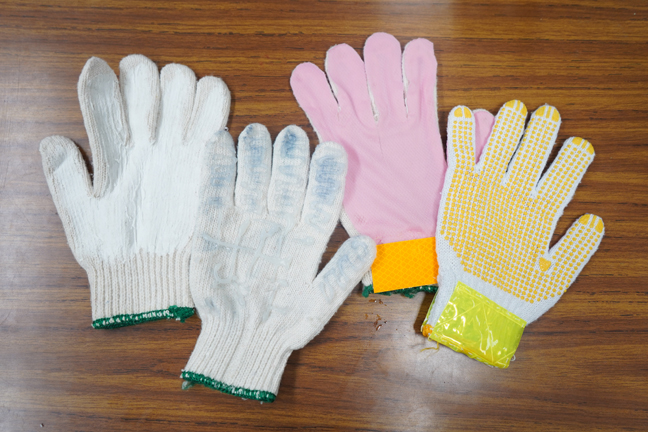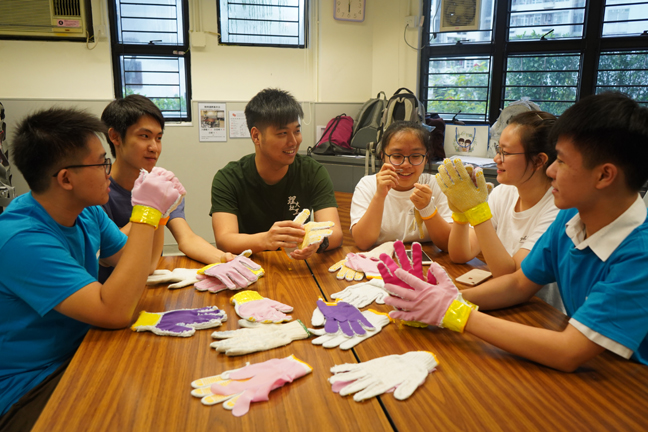Story
Protective gloves for the unsung heroes
At dusk, a few young people approached cleaning workers who were taking rest and asked them to try on some ‘Protective Gloves’, the invention that they are working on. Over the past months, a social innovation team of eight Secondary 5 students, known as Highlighter, has spent their spare time penetrating into big streets, back lanes or even the refuse rooms, looking for cleaners and rag-pickers in order to listen to their needs and ask for their feedbacks on this pair of gloves. The students want to modify and improve their invention, and step by step turning it into a helpful tool that protects the hands of these workers.
The eight youths are participants of The Salvation Army Youth Lab Project, who try to solve some social problems by using their creativity. The team decided to focus on a common problem that cleaners and rag-pickers would daily face because of a volunteering experience that had touched team member Rachael’s heart, ‘I remember that it was a Mid-Autumn warmth giving project. I was giving away some mooncakes and daily necessities to a cleaner, and I was surprised to see among the necessities there were adhesive bandages. The fellow volunteer noticed the puzzled look on my face and explained to me that cleaners may easily be poked and hurt by sharp objects such as injection needles and toothpicks when they handle the garbage, and it can be very dangerous if the wounds are improperly treated.’
The team is aware that most cleaners only wear ordinary cotton work gloves or plastic gloves, which hardly provide any protection. Very often there are liquids inside the garbage bins and the gloves that cleaners wear will get wet easily. Once dampened, those gloves can hardly dry thoroughly and would stick on the skin throughout the day, causing great discomfort on the workers’ hands. The same thing would happen to rag-pickers. Team member Ivan says that there are indeed more durable and protective gloves available in the market, but they cost up to $60 or $70 a pair. Cleaners and rag-pickers would rather endure the discomfort to save money. ‘Cleaners and rag-pickers are the disadvantaged groups in our community. Not many people would listen to their needs. We hope we can bring some changes to these people by working our ideas together, even be it just a small step. We should also speak up for them!’
Materialising the ideas
The invention of ‘Protective Gloves’ aims to give the ragpickers and cleaners proper protection when they handle the trash. Completely handmade, the ‘Protective Gloves’ are just in a prototype phase. They may seem to be roughly made, but they have already undergone several modifications. The Youth Lab Project is not just an ordinary experiential project. Participants not only provide ideas to address grassroots challenges, but also to put those ideas into practice with limited funding. That is why the team has given serious consideration in choosing materials and the production method, aiming to make their products quality and affordable.
The team first bought some cotton work gloves with rubber gripper dots, then they removed the cotton fabric on the back of the gloves and sewed a piece of ice towel on instead, making them lighter and more breathable. The material also dries up more quickly after getting wet. As for the protection of the gloves, it mainly comes from an inner layer of soft plastic, which was found after tests being basically protective against sharp objects such as needles, blades and scissors. However, there is still room for improvement. ‘Feedbacks show that the gloves with plastic layer may cause some hindrance to movements and impair the flexibility when an user grabs an object,’ said team member Ceci. ‘We will continue to find ways to improve them.’ Team members obtain invaluable lessons from continuous trials and adjustment of strategies.
Reflect on the meaning of ‘failure’
Early this year, the team was invited by Salvation Army social workers to participate in the ‘Common Life Failures’ exhibition organised by The Salvation Army Yaumatei Integrated Service for Young People, an event that encouraged young people to share their ‘failure experiences’ and reflect on what these experiences truly mean. The team shared the experience they had when actually producing the ‘Protective Gloves’ – although it was full of failures and challenges, it also brought them some profound insight: In mainstream social view, being a cleaner or a rag-picker may be considered a ‘failure’, but there are in fact more factors that contributed to this social issue, such as lack of labour protection and poverty, on which we should definitely reflect more.
Youth Lab Project motivates these secondary school students to walk out of the classrooms and reach out people in the real world. Team members Ehren and Loy encourage other young people of their age that, while studies are important, they should not bury themselves in schoolwork, as there is a big world out there. Having deeper contact with different walks of life would allow them to become more conscious of those who are being neglected in the society. Showing these people care, even by simply saying ‘hang in there’, may encourage them to get through the difficulties in life.
The Salvation Army Youth Lab Project
The Project inspires young people to be a Change Maker and encourages them to give solutions to a social challenge that they would like to resolve. Participants are allowed to explore resources and seek solutions with innovative and people-oriented ways that combine Design Thinking and Problem Solving. ‘For these young people, the “Protective Gloves” project is a learning process of caring for society and building empathy. There’s no deadline for the Project, so they may continue putting their ideas to work. We hope that while bringing changes to the society, the project may also enrich the youths’ experience and development,’ said social worker Lui Hok-chi.










